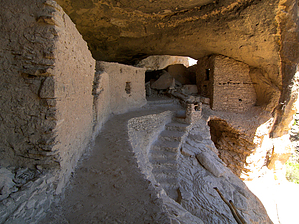| Guide | ♦ | 26 Triplogs | 0 Topics |
details | drive | permit | forecast | 🔥 route |
stats |
photos | triplogs | topics | location |
| 258 | 26 | 0 |
Cliff Dwellings in Cliff Dwellers Canyon by PaleoRob The Mimbres branch of the Mogollon culture inhabited southwestern New Mexico from around 400 AD up until just before 1300, when this area, like the Colorado Plateau to the north, was abandoned. Before they left, though, they constructed hundreds of villages across the region, grew crops, traded with neighbors, and made some of the most beautiful pottery ever created in the southwest, Mimbres Classic Black-on-White, depicting beautiful scenes of people, animals, and mythological figures and creatures. Gila Cliff Dwellings offers a glimpse into the daily life of these people.
From the Visitor's Center, drive west on NNM15 until the road ends in a parking area. There is a small contact station here, with a self-pay fee kiosk and trail brochures. During the summer, guided tours are offered as well. Drop into the contact station, and then head up the trail. The trail starts immediately to the west of the contact station and begins climbing up the east wall of Cliff Dwellers Canyon. The hike is shady, under cottonwood and juniper trees, and the trail is wide and relatively well graded. You can catch glimpses of the cliff dwellings on the opposite canyon wall as you continue upcanyon. You then reach a switchback, and the ruins come into full focus on the northwest cliff face. The structures appear to be well preserved. The switchback provides a convenient resting place to catch your breath, if you are unaccustomed to the altitude, and admire the ruins. The trail now climbs up towards the ruins and their alcoves, or caves as they are called at this site. They are numbered, and if you picked up a trail brochure, you can follow along with the numbering system and pick out the post holes, bedrock metates, and pithouse remains in the first couple of caves you'll come across. During the summer months, there are often rangers and volunteers stationed here along the trail in the various "caves" to explain various features and answer questions. The highlight of the ruins come after the first two caves. The next three caves contain an interlinked series of well-preserved dwellings, storage, and ceremonial rooms. There is an enormous plaza at the back of the ruin, against the back wall of a very deep alcove. Very interesting, in that most plazas, even in cliff dwellings, are located near the front or in-between room blocks. Here the plaza seems to be guarded by the rooms. The trail leads you through and around some of the various rooms, while the trail guide points out various features. Almost all the wood in the ruin is original, and tree-ring dates from the beams yield late 1270's-1280's dates - barely over a decade of occupation of the largest structures in the dwelling complex! Some of the storage rooms still contain large quantities of desiccated corn cobs. Pretty cool. Also, lookout for a tower masoned into a fin at the cliff edge that separates two of the caves. When you're done pondering the past in the ruins, continue on the trail, and it'll drop you back down to the main trail and then to the parking area. While you're in the area, it is worth the time to do some of the other day trails near the monument. Several easy trails explore beautiful mountain forests, creeks, and canyons not far from the monument, while other trails can take you into the backcountry for many days. Check out the Official Route and Triplogs. Leave No Trace and +Add a Triplog after your hike to support this local community. | |||||||||||||||||||||||||||||||||||||||||||||||||||||||||||||||||||||||||||||||||||||||||||||||||||||||||||||||||||||||||||||||||||||||||||||||||||||||||||||||||||||||||||||||||||||||||||||||||||||||||
 Route Editor
Route Editor





